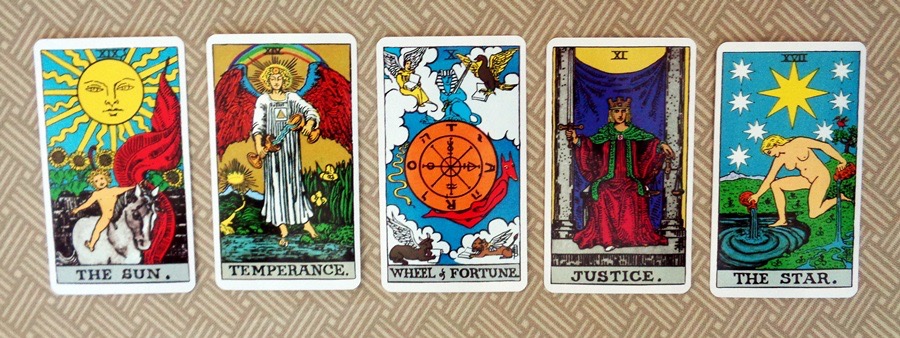By Wayne Limberger
A woman wants to know if her husband is cheating on her.
A man wants to know if his wife is going to file for divorce.
A businessman wants to know if a proposed investment would be a wise move.
A high-school graduate wants to know whether it would be best to go to college or join the workforce.
A litigant wants to know if the lawsuit will be won or lost.
An ill woman wants to know the prognosis for her malady.
These people all expect a straight answer with no verbal
tap-dancing and no mincing of words. What do we tell them?
I don’t know about you, but I’m leery of unqualified “Yes” or “No” answers since I don’t think the cards speak that language with any great clarity or precision. They’re big on qualifiers, though:
“Yes, but . . .”
“Not unless . . .”
“Maybe if . . .”
Almost every scenario is conditional, requiring some action by the querent to make it so (or not so, as the case may be). This is where the concept of “empowerment” trumps that of “fortune-telling.” We like to say that nothing is carved in stone, and everyone can avoid or at least mitigate unhappy consequences (or encourage happy ones) if only they have the foresight to make informed decisions. Our job as diviners is to furnish the hidden knowledge that can be translated into such foresight as long as the querent pays attention and follows through on it.
My personal belief is that the track into the future has been laid
but the switchman may choose to reroute the train at any time before
the destination is reached. It may never be known whether that choice
results in avoiding a tragic train-wreck or simply delays the ETA. I
like to talk in terms of possibilities, not certainties; but when the
testimony in the cards is very plain I might stick my neck out and
describe likelihoods or probabilities, always making it clear that
each of these potential outcomes hinges upon the querent’s action
or inaction in response to the insights offered by the reading. We as
readers tend to get very good at variations on “maybe,” such as
“could,” “may,” “might,” “suggests,” implies,”
“seems,” “appears,” and the like, limited only by our
creative command of the necessary weasel-words; intransitive verbs
like “will,” “would,” “won’t,” “can’t,”
“wouldn’t” and “couldn’t” don’t get much play, and we
shy away from the absolutes “always” and “never” like the
plague.
As we diligently try to pound our square pegs into the round holes
of the querent’s situation, none of us should be naive enough to
assume that every utterance of the oracle is the whole truth. I know
it doesn’t sound very spiritual or mystical but, if we’re honest
about it, our observations are always tempered by a certain cautious
hedging; the better we are at bringing intuitive conjecture together
with hard-headed plausibility in a single sentence, the more
well-received – and ideally the more accurate – our
pronouncements will be. As Launcelot says in Shakespeare’s The
Merchant of Venice, “truth will out,” and I’d
like to be there every time it does to make the appropriate mark in
the tarot tally-sheet, but I rarely am.
I often talk about the “theater of tarot” as a performance
art: the mystique of choosing the deck and the significator, the
niceties of properly framing and focusing on the question, the
razzle-dazzle of the shuffle and cut, the storyteller’s inspired
hocus-pocus of deciphering the cards. But perhaps the biggest feat of
legerdemain we perform is our clever avoidance of being maneuvered
into an unequivocal “Yes” or “No” answer. The rabbit we pull
out of our magic hat may be all fluff and no flesh, but like the
Tarot de Marseille’s stage-magician, we divert the observer’s
gaze away from that fact with a calculated sideways glance. But we do
it with carefully tailored words rather than gestures. I know I
haven’t heard you do it, but I can almost guarantee you
have on occasion.
So if I’m confronted with “Yes, but is he cheating on
me?” I stare sagely at the cards, pause pregnantly, and declare
something like “The situation appears to offer the opportunity.”
In other words, a definite “maybe.” But if I’m asked a medical,
legal or financial question that entails professional liability on my
part, I will unfailingly decline to do the reading in those
particular terms and may suggest a different approach. I’m
perfectly happy to announce “The cards advise you to get a second
opinion,” but you’ll never hear me say “The cards inform me
that your doctor is a quack.” There are more ways than one to get
at the truth, and being prudently oblique may be best for all
concerned.
